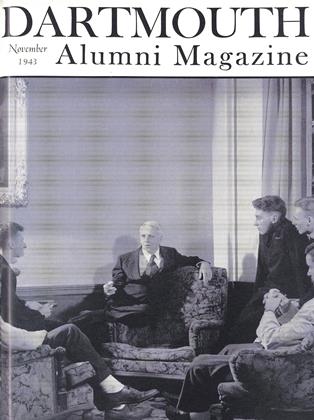by Louis T. Benezet'36. Bureau of Publications, Teachers College, Columbia University, 1943, pp. VI +190. $2.35.
Some years ago a British psychologist said, "A principal part of education is to discover a bent and cultivate it." This prescription has been followed by progressive education in building a program which respects the interests and development of the student by means of individualized instruction. In this, his first book, Benezet has made a well-considered study of the progressive college programs for the improvement of general education.
Following a statement of the problem, general education is discussed in terms of its meaning, function and operation. Almost half of the book is devoted to three progressive college programs: Sarah Lawrence, Bennington and Bard. The Bennington program is accorded the fullest treatment. A fair and accurate picture is drawn of the development and structure as well as the aims and purposes of these college programs. Benezet also reports and summarizes his conferences with fifty members of the three staffs of these colleges. The opinions indicate convincingly the importance of emphasizing the development of the students' interest in harmony with socially integrated patterns. Mere subject matter is thought to be of lesser importance than vitality and enduring quality of the students' intellectual motives. In his summary and interpretation Benezet points out the need for colleges to formulate concrete aims and methods for developing social responsibility and concern. In the progressive colleges he finds that general education becomes an alive and sustaining value for the student. "The chief contribution," he concludes, "is the furnishing of methods by which the individual of college age comes to see drive and meaning in his study."
Benezet has prepared a significant, document for individualized and vitalized education. In view of the reorganization through which college education is likely to pass in the post-war period, his work promises to be a useful guide.
 View Full Issue
View Full Issue
More From This Issue
-
 Article
ArticleROBERT FROST RETURNS
November 1943 By CHARLES G. BOLTE '41 -
 Article
ArticleWILLIAM JEWETT TUCKER
November 1943 By ALEXANDER LAING '25 -
 Lettter from the Editor
Lettter from the EditorLetters from Dartmouth Men in the Armed Forces
November 1943 -
 Class Notes
Class Notes1918
November 1943 By ERNEST H. EARLEY, DONALD L. BARR -
 Class Notes
Class Notes1937
November 1943 By JOHN H. DEVLIN JR., FRANCIS T. FENN, JR. -
 Class Notes
Class Notes1917
November 1943 By MOTT D. BROWN JR., DONALD BROOKS
Irving E. Bender.
Books
-
 Books
BooksMissing the Mark
JANUARY/FEBRUARY 1985 -
 Books
BooksWAR AND THE POET
January 1946 By Allan Macdonald -
 Books
BooksTHE CRYSTAL YEARS
January 1953 By Eric P. Kelly '06 -
 Books
BooksCELEBRITIES AT OUR HEARTHSIDE.
June 1960 By HERBERT F. WEST '22 -
 Books
BooksGOVERNMENT IN AMERICA.
February 1958 By HERBERT GARFINKEL -
 Books
BooksTHE STORY OF PITNEY-BOWES.
October 1961 By WAYNE G. BROEHL JR.



